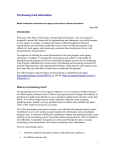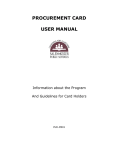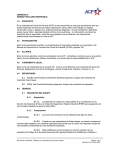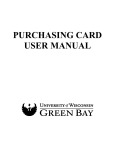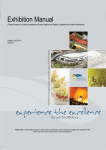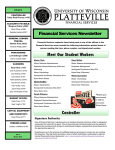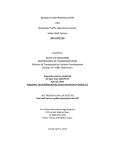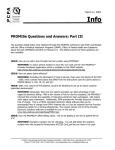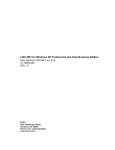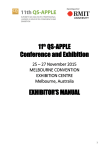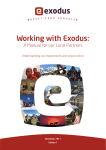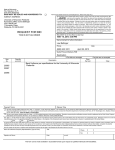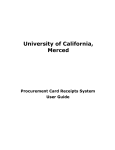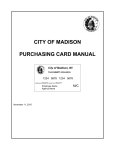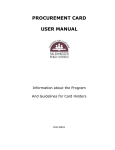Download Purchasing Card Manual - University of Wisconsin System
Transcript
UNIVERSITY OF WISCONSIN SYSTEM PURCHASING CARD POLICY & PROCEDURE MANUAL University of Wisconsin System Financial Administration 780 Regent Street, Suite 255 Madison, WI 53715 Issued July 2008 Revised 7/22/2015 UNIVERSITY OF WISCONSIN SYSTEM PURCHASING CARD POLICY & PROCEDURE MANUAL PREFACE By implementing the State of Wisconsin’s Purchasing Card Program, the University of Wisconsin System is taking another step to provide campuses more flexibility in making small dollar purchases up to $5,000 and to significantly reduce the paperwork and processing time. (For the purposes of this Policy and Procedure Manual, campus includes all UW campuses, UW-Extension, and UW-System Administration.) This policy and procedure manual is designed to present the framework for implementing and managing a successful program on the campuses. It contains the hands-on detail management program administrators and individual cardholders need to know to make the program work effectively. These instructions may be customized for your internal policies and procedures. Each campus is responsible for administering the purchasing card program and should designate a person as the Purchasing Card Program Administrator. This person will lead a team of purchasing and accounting personnel for program implementation and ongoing administration. Large campuses may have more than one individual to lead teams within the campus’ divisions, i.e., site managers. The Purchasing Card is the campus’ primary tool for making small dollar purchases. Implemented state-wide in 1996, this program has proven effective and efficient in making purchases within delegated purchasing authority. We welcome your feedback to ensure that the program meets UW campus’ needs. UNIVERSITY OF WISCONSIN SYSTEM Purchasing Card Policy and Procedure Manual July 2015 TABLE OF CONTENTS 1. Overview of Purchasing Card Program ...................................................................................................... 1 1.1. Purpose .............................................................................................................................................. 1 1.2. Benefits .............................................................................................................................................. 1 1.3. The Credit Card Company ................................................................................................................. 2 2. Where to Get Help ...................................................................................................................................... 2 2.1. US Bank ............................................................................................................................................. 2 2.2. Purchasing Card Contacts .................................................................................................................. 2 3. Policies and Procedures .............................................................................................................................. 3 3.1. Definitions ......................................................................................................................................... 3 3.2. Campus Responsibilities .................................................................................................................... 4 3.3. Campus Purchasing Card Program Administrator (PCPA) Responsibilities ..................................... 6 3.4. Cardholder Responsibilities ............................................................................................................... 8 3.5. Cardholder’s Supervisor or Site Manager Responsibilities ............................................................... 9 ii UNIVERSITY OF WISCONSIN SYSTEM Purchasing Card Policy and Procedure Manual July 2015 APPENDIXES APPENDIX A Forms ....................................................................................................................................10 A-1 A-2 A-3 A-4 A-5 APPENDIX B Site Manager Access Request ....................................................................................11 Account Reviewer Access Request ............................................................................12 Account Maintenance Request ...................................................................................13 Purchasing Card Log ..................................................................................................14 Statement of Disputed Item ........................................................................................15 How to Use the Purchasing Card ..........................................................................................16 A. General Procedures ........................................................................................................16 B. Purchases by Telephone, Internet, Fax, or Mail .............................................................16 C. Business-Related Travel Purchases ...............................................................................17 APPENDIX B-1 Commonly Questioned Items ................................................................................................19 APPENDIX C Procurement Regulations ......................................................................................................22 A. B. C. D. State of WI Bureau of Procurement Policies and Procedures ........................................22 Statewide Contracts .......................................................................................................22 Minority Vendors ...........................................................................................................22 Ineligible Vendors..........................................................................................................22 APPENDIX D State Merchant Category Code (MCC) Standards ................................................................23 APPENDIX E Returned Goods, Vendor Debit Cards/Vendor Rebates, Disputed Transactions ..................25 A. Returned Goods .............................................................................................................25 B. Vendor Debit Cards/Vendor Rebates .............................................................................25 C. Disputed Transactions ....................................................................................................25 APPENDIX F US Bank Access Online Program Management Tool ...........................................................27 A. B. C. D. E. F. G. Overview........................................................................................................................27 Access to US Bank Access Online Program Management Tool....................................27 Statements ......................................................................................................................27 Transaction Reallocation ...............................................................................................28 Comments Field .............................................................................................................28 Electronic Transaction Reviews/Approvals ...................................................................29 Reporting .......................................................................................................................29 APPENDIX G Statement...............................................................................................................................31 APPENDIX H Sales and Use Tax Exemption and 1099 Reporting ..............................................................32 APPENDIX I Frequently Asked Questions (FAQs) ....................................................................................33 iii UNIVERSITY OF WISCONSIN SYSTEM Purchasing Card Policy and Procedure Manual July 2015 1. OVERVIEW OF PURCHASING CARD PROGRAM 1.1. PURPOSE The State of Wisconsin, in partnership with US Bank, entered into a contract to provide a Purchasing Card Program, including a web-based program management tool, to help better manage expenditures and achieve overall goals. By implementing this program, the University of Wisconsin System is taking another step to provide campuses more flexibility in making small dollar purchases up to $5,000 and to significantly reduce paperwork and processing time. This policy and procedure manual is designed to present the framework for implementing and managing a successful program on the campuses. It contains the hands-on detail management Purchasing Card Program Administrators (PCPA) and individual cardholders need to know to make the program work effectively. The purchasing card is a tool to manage purchasing and accounting resources by concentrating low-dollar purchases in a less paper-intensive process. Use of the purchasing card is campus liability, not personal liability for the cardholder. The cardholder’s credit rating will not be affected by use of the purchasing card. However, the cardholder is responsible for maintaining security of the card and for any misuse as outlined below. All documents related to the purchasing card may be fully disclosed as a public record to the extent provided by the Open Records Law. The purchasing card is: • • • • Delegated Purchasing Authority granted by the Purchasing Department to individual UW employees. Authorized for official business use only. Authorized for individual purchases through $5,000. Authorized for purchases greater than $5,000 on statewide contracts where indicated OR when the purchases are for business-related travel booked through Fox World Travel OR when authorized by the State Bureau of Procurement and the State Controller’s Office. • Authorized for use with only certain categories of vendors and commodities. • Authorized for certain travel costs, such as airline tickets and travel agency service fees purchased in accordance with policy 1201 –Travel & Expense – Purchase & Payment of Business Air Travel; lodging and any applicable taxes; car rental and rental car gas; hotel and airport parking; and other commercial transportation, including trains (Amtrak), buses, taxis, and shuttles; registration fees. The purchasing card is not: • • • • • • For individual travel booked outside the contract. For cardholder personal purchases or identification, under any circumstances. A means to avoid appropriate procurement or payment procedures. A card to access cash, cash equivalents, or credit. A right of employment. For reimbursable meal costs. Individual meals are not allowed to be charged on the purchasing card. • For inter-agency or intra-agency use (except for retail purchases from campus operations that sell goods to the public and accept a charge card, i.e., Document Sales, campus bookstores, etc.). 1.2. BENEFITS Use of the Purchasing Card will: • Allow employees to obtain many goods and services much faster and easier. • Reduce the number of purchase orders and requisitions. • Provide cost savings through consolidated payment (biweekly payments to US Bank covering each campus’ purchasing card transactions versus individual vendor invoices). 1 UNIVERSITY OF WISCONSIN SYSTEM Purchasing Card Policy and Procedure Manual July 2015 1.2 BENEFITS (continued) Important benefits for vendors include: • Receiving payment in three business days. • Elimination of after-sale invoicing and collection activities. • No additional applications or paperwork necessary if they are already VISA vendors. 1.3 THE CREDIT CARD COMPANY This program is governed by the terms and conditions of a Master Agreement between the State of Wisconsin and US Bank. In most situations, individual cardholders and departments will deal with the campus’ designated Purchasing Card Program Administrator (PCPA). 2. WHERE TO GET HELP 2.1. US BANK US Bank Cardholder Customer Service Available 24 hours a day, including weekends Phone: (800) 344-5696 E-Mail: [email protected] If a card becomes lost or stolen, the cardholder must immediately notify US Bank Cardholder Customer Service at (800) 344-5696 and the campus PCPA. On weekends or after campus business hours, the cardholder is responsible to call the US Bank Cardholder Customer Service. Notify the campus PCPA the next business day to report the lost or stolen card. To report suspected fraud, notify US Bank Fraud Department at (800) 523-9078. Unlike personal credit cards where cardholders are responsible for paying the first $50.00 if the card is stolen or misused, the Purchasing Card program holds the campus responsible for paying all charges resulting from stolen or misused cards until US Bank has been notified. The US Bank/VISA Purchasing Card Program provides liability protection to the State once notification of any loss, theft, or fraudulent use is made. However, the same level of liability protection does not apply to cards that are made available to multiple users. Therefore, each purchasing card must be used only by the person whose name appears on the card. 2.2. PURCHASING CARD CONTACTS Purchasing Card Program Manager (PCPM) Allen Hesselbacher UW-System Administration 780 Regent Street, Suite 255; Madison, WI 53715 Phone: (608) 263-5692 FAX: (608) 262-5316 E-Mail: [email protected] The PCPM is the liaison between the campuses and the State Bureau of Procurement (SBOP). Any direct communication between the campuses and the SBOP should contain a CC to the PCPM. 2 UNIVERSITY OF WISCONSIN SYSTEM Purchasing Card Policy and Procedure Manual July 2015 2.2 PURCHASING CARD CONTACTS (continued) The PCPM is responsible for the overall planning and administration of the UW System Purchasing Card Program system-wide. Please share suggestions for improving the Purchasing Card Program, including suggestions for this policy and procedure manual, training, and other policy concerns. State Bureau of Procurement Enterprise Cards Program Manager Cheryl Edgington Department of Administration 101 East Wilson Street, 6th Floor; Madison, WI 53703 Phone: (608) 266-1060 FAX: (608) 267-0600 E-Mail: [email protected] or [email protected] H Please copy Allen Hesselbacher ([email protected]), UWS Purchasing Card Program Manager, when contacting DOA. The State Bureau of Procurement Enterprise Cards Program Manager is responsible for the overall planning and administration of the Purchasing Card Program state-wide. This individual approves cardholder limits in excess of $5,000 and performs audits of transactions. Purchasing Card Program Administrator (PCPA): Each campus will designate a PCPA who is responsible for the overall planning and administration of the Purchasing Card Program campus-wide, including assisting departments in determining how to use the purchasing card to fit their needs, planning and coordinating training, customer service, and post-audit review. Large campuses may have more than one individual to lead teams within the campus’ divisions, i.e., site managers. 3. POLICIES AND PROCEDURES This section establishes the purchasing card policies and procedures and identifies specific responsibilities of key individuals for implementing and managing a successful program on the campus. 3.1 3.2 3.3 3.4 3.5 Definitions Campus Responsibilities Campus Purchasing Card Program Administrator (PCPA) Responsibilities Cardholder Responsibilities Cardholder’s Supervisor Responsibilities 3.1 DEFINITIONS Billing File - Detailed biweekly file that is received electronically by the respective campus from the purchasing card vendor. Campus - Includes all UW campuses, UW-Extension, and UW System Administration. Cardholder - An authorized UW employee (permanent, project, or LTE) who has been issued a purchasing card by the campus. MCC - Merchant category codes assigned by the banking industry. (See Appendix D.) 3 UNIVERSITY OF WISCONSIN SYSTEM Purchasing Card Policy and Procedure Manual July 2015 3.1 DEFINITIONS (continued) May – Permission to; at the option or discretion of. Should – A reasonable expectation. Must – An obligation of, or requirement to. Original Receipts - Written acknowledgement that goods and/or services have been received. All receipts should include the date of purchase, vendor name, items purchased, and prices. Any exceptions must be documented in writing. Examples of original receipts are as follows: Purchases in Person - Must have a detailed receipt, at the time of purchase, clearly identifying each item purchased. Phone/Fax Orders - The original invoice, packing slip, or shipping confirmation sent with the goods purchased. If the packing slip does not have the itemized detail, write it on by hand. Internet Orders - Print a copy of the order, confirmation screen, or invoice sent via email that shows what was purchased and the dollar amount. Registration Fees - Attach the registration form and supporting documentation that includes actual dates; location; title of the conference, convention, or seminar; amount of fee; and a breakdown of specific costs (meals, etc.) included in the fee. Note: This may require obtaining both a payment receipt and a copy of the applicable page from the brochure, application, or registration form. Purchasing Card - A charge card issued to an authorized UW employee (permanent, project, or LTE), by the campus, through the Master Agreement between the State of Wisconsin and US Bank. Purchasing Card Program Administrator (PCPA) - Individual(s) appointed by the campus to manage, coordinate, and control purchasing cards within the campus. Purchasing Card Record - Form used by the cardholder to maintain a record of purchases, including supporting documentation and approvals. Examples include: Purchasing Card Log (Appendix A-6) reconciled to Statement (Appendix G) with supporting documentation and approvals; Statement (Appendix G) with supporting documentation and approvals; Transaction Detail Report (Appendix F - section G. Reporting) or other report reconciled to Statement (Appendix G) with supporting documentation and approvals. Site Manager – Individual responsible for managing a department’s or division’s cardholders. Statement - Detailed report of charges that is sent to the cardholder by the purchasing card vendor at the end of each biweekly billing cycle. (See Appendix G – Statement.) Supervisor - Individual responsible for approving the cardholder’s time and leave form, or an individual assigned supervisory review authority who is organizationally independent of the cardholder. Supporting Documentation – Any record or information which verifies a purchase. This includes an itemized vendor receipt, agenda, or various travel-related items (see Appendix B, Section C). In addition, any purchase that is non-routine in nature, quantity or dollar amount must include a business purpose. 4 UNIVERSITY OF WISCONSIN SYSTEM Purchasing Card Policy and Procedure Manual July 2015 3.2 CAMPUS RESPONSIBILITIES UW-System Administration obtained approval to participate in the Purchasing Card Program from the State Bureau of Procurement (SBOP) and the State Controller’s Office (SCO). This section is an extension of the Cooperative Agreement on Accounting, Auditing and Internal Control Activities between UW-System Administration and the campuses in which delegation is authorized by section 16.53 Wis. Stats. In addition, purchasing delegation is authorized by section 16.71 Wis. Stats. 3.2.1 The campus is responsible for establishing proper controls, including: Developing internal policies and procedures within the guidelines identified in this policy and procedure manual. Monitoring use of the cards, by individual cardholders, to ensure that all purchases are made in accordance with applicable laws and regulations, including, but not limited to, state statutes and University of Wisconsin System and campus policies and procedures. Performing periodic audits of cardholder records, including the purchasing card record, original receipts, and reconciled billing statements, to ensure compliance with all of the guidelines, policies, and procedures governing this program. These guidelines are derived from the State Procurement Manual, the State Accounting Manual, UW System Policy and Procedure Manual, the campus’ Purchasing Card Policy and Procedures Manual, and US Bank requirements. The purchasing office, accounting office, and/or campus internal auditors will conduct random audits of purchasing cards use to ensure that: • • • • • • Policies and procedures are being followed. Purchase volume appears reasonable. Transactions are appropriate. Purchases were not made from ineligible vendors. Documentation is complete. Proper internal controls exist with regard to the program. Misuse of the card, which may include personal or other unauthorized charges, will result in immediate disciplinary steps, up to and including dismissal of the cardholder. The campus PCPA or the cardholder’s supervisor will determine if such charges have occurred. If misuse of the card occurs, item(s) must be immediately returned to the vendor for full credit OR the employee must repay the campus amounts, including any applicable state, county, or city sales taxes. Even if the vendor does not charge applicable taxes, the campus must collect and remit the taxes to the State of Wisconsin Department of Revenue. 3.2.2 The campus is responsible for maintaining budgetary controls. 3.2.3 The campus is responsible for establishing individual cardholder credit limits. The program includes the flexibility to personalize individual cardholder authorizations in the areas of credit and single purchase limits. The single purchase limit may not exceed $5,000 per transaction without prior approval from the SBOP and the SCO except when used, where indicated, on authorized state contracts. 3.2.4 Payment Cycle – Payment is the responsibility of each campus. The Purchasing Card Billing Cycle End Date Calendar provides the billing cycle end dates based on the calendar year. Billing Cycle Calendars are available online. HU Campus payment transactions must arrive at the bank in time to be posted prior to the close of the subsequent cycle. Any exceptions to this requirement due to holidays or major system issues will be announced as needed. 5 UNIVERSITY OF WISCONSIN SYSTEM Purchasing Card Policy and Procedure Manual July 2015 3.2 CAMPUS RESPONSIBILITIES (continued) 3.2.4 Payment Cycle (continued) US Bank provides a Statement Billing File (SBF) 2.0 Pro Card file that includes all transactions that were charged by the campus during the biweekly billing cycle. Transactions will be coded to the default accounting code unless reallocated to one or more valid accounting codes prior to the SBF extraction. Campuses using the Shared Financial System (SFS) will use the SFS GL.1.13 ProCard Interface Load to create journal entries from the SBF for entry into SFS. HU UH Transactions should be reviewed against the reconciled statement and any discrepancies resolved with the accounting office. Transactions that reject in the accounting system must be corrected and approved by campus staff. 3.2.5 Purchasing Office responsibilities include: The purchasing office is responsible for Procurement Regulations (Appendix C). The purchasing office will record and report to the State Bureau of Procurement purchases made with Wisconsin-certified minority business enterprises on a monthly basis, i.e., Business Enterprise Procurement Activity Reporting (PRO G-2). Campuses will use purchasing card vendor reports to compare against the Wisconsin certified minority business enterprise listing. Include these vendors in the Minority Business Enterprise Procurement Activity Report (form DOA-3005). HU UH 3.2.6 All purchasing card fraud must be reported to the campus PCPA and the campus PCPA’s supervisor who are responsible for following UW System’s Breach of Fiscal Integrity (F16) policy. HU UH 3.3 CAMPUS PURCHASING CARD PROGRAM ADMINISTRATOR (PCPA) RESPONSIBILITIES 3.3.1 The campus purchasing card program administrator (PCPA) is the liaison between the campus, the PCPM, the State Bureau of Procurement’s Enterprise Cards Program Manager, and the US Bank Account Coordinator. Responsibilities include, but are not limited to: • Approve, process, and retain purchasing card applications. • Maintaining a log of cardholders, cardholder’s supervisors, and site managers, and reconciling this log with records at US Bank. • Providing assistance with vendors. • Responding to inquiries regarding internal policies and procedures, billing information, missing statements, damaged, lost, or stolen purchasing cards. 3.3.2 Cardholder Setup Process: • Obtain, process, and retain a completed electronic Purchasing Card Application and Use Agreement from each cardholder applicant. • Coordinate the accounting information for the cardholder with the accounting office. • Provide training to cardholders, supervisors, and site managers, including the use of US Bank Access Online Program Management Tool. (See Appendix F.) 6 UNIVERSITY OF WISCONSIN SYSTEM Purchasing Card Policy and Procedure Manual July 2015 3.3.3 Other PCPA Responsibilities: Account Maintenance - Card limits and other information such as name change, address, and phone may be changed by the appropriate departmental authorized person. A sample Account Maintenance Request form is provided in Appendix A-5. Before a campus authorizes cardholders to make purchases over $5,000, except when used on authorized state contracts, the PCPA must submit a request to the State Bureau of Procurement’s Enterprise Cards Program Manager (CC to the PCPM) explaining the need for an increased limit, the duration of the need, and steps to be taken to ensure controls will be maintained. Each campus PCPA should monitor card expiration dates and work with the US Bank Account Coordinator on reissues. Review the previous year’s card usage and, if necessary, make cancellation recommendations. Additional records regarding usage can be found using Access Online reporting tools; see the Access Online Cardholder Reference Guide. Note: Vendors with embedded credit card numbers will have to be notified each time new card numbers or expiration dates are distributed. Card Usage - Cards remain the property of US Bank and must be surrendered immediately upon termination of employment, transfer to another department, or upon request for any reason by an authorized person (such as the campus PCPA or the cardholder’s supervisor). If the campus PCPA or the cardholder’s supervisor determines that personal or other unauthorized charges have occurred, see steps outlined in section 3.2.1 – Misuse of the card. Timely cancellation of the card is an integral part of maintaining the integrity of the program. Whenever possible, complete the application forms to obtain a card for the new employee or an interim replacement cardholder prior to the current cardholder’s departure date. The cardholder must acknowledge any outstanding orders when returning the purchasing card to their supervisor. The supervisor is responsible for contacting the campus PCPA, who will cancel the card. The supervisor should cut the card in pieces and dispose of it. Surrendered cards are not reissued to other employees for use. Note: If there are established accounts with vendors that relate to specific credit cards, these will also need to be canceled and reestablished as a new account with the successor’s information. Record Retention - Purchasing card records, including supporting documentation, and Dispute Forms are to be retained for six (6) years plus the current year, in a campus designated central storage area, i.e., Accounts Payable, Purchasing, or the college division level offices. Note: Record disposition may not take place if there is an open records request, or if there is pending litigation or an audit involving the records. Procurement Regulations - See Appendix C – Procurement Regulations for information on State of Wisconsin Bureau of Procurement policies and procedures, Statewide Contracts, Minority Vendors, and Ineligible Vendors. 7 UNIVERSITY OF WISCONSIN SYSTEM Purchasing Card Policy and Procedure Manual July 2015 3.4 CARDHOLDER RESPONSIBILITIES 3.4.1 Before a UW employee will be issued a purchasing card, s/he will: • Complete and electronically sign a Purchasing Card Application and Use Agreement that includes a statement acknowledging her/his understanding of the restrictions on the use of the card and the possible actions if s/he violates the conditions of statewide and campus policies on use of the purchasing card. Electronically route the signed Purchasing Card Application and Use Agreement to the appropriate Approving Officials (Supervisor, Dean’s/Director’s Office) email address for their review and signatures. • When picking up the new purchasing card, the cardholder must sign to acknowledge the receipt of the purchasing card from the PCPA. Each cardholder is required to activate the card by calling US Bank at the 1-800 number printed on the back of the card. • Receive training as established in campus policies and procedures and documented by the campus PCPA. 3.4.2 Cardholder must understand and comply with the following purchasing card program policies and procedures: • General procedures, including making purchases by telephone, internet, fax, or mail and business-related travel are included in Appendix B – How to Use the Purchasing Card. Appendix B-1 contains a list of Commonly Questioned Items. • Always keep purchasing cards and account numbers in a secure place. The purchasing card should be treated with the same level of care you use with your personal credit cards. Each cardholder is directly responsible for the physical security of their card and account information. • A statement (Appendix G) will be delivered biweekly to the cardholder directly. • The cardholder must maintain a purchasing card record, attach all original receipts, and forward these source documents biweekly to the supervisor/site manager for review and approval. The supervisor/site manager will store these records in the designated record retention area. • Procedures related to Returned Goods, Vendor Debit Cards/Vendor Rebates, and Disputed Transactions are included in Appendix E. • Cash Advances (ATM machines) are strictly prohibited. • Cash Equivalents (Gift Cards, Gift Certificates, etc.) are strictly prohibited. • Purchase of non-business (personal) items or services are strictly prohibited. • Individual reimbursable meal costs are not allowed to be charged on the purchasing card; however, food purchases for group meetings and events are allowed. Supplemental documentation must be retained with the purchasing card record for all food purchases that identifies the name and purpose of the function and who attended it, by name or affiliation. Refer to the Headquarters City and UW-Sponsored Events Policy which provides details on all UW sponsored events attended by the general public or by UW employees. 3.4.3 Misuse or non-adherence to the purchasing card policies and procedures may result in suspension or revocation of individual cardholder privileges and appropriate disciplinary action. 8 UNIVERSITY OF WISCONSIN SYSTEM Purchasing Card Policy and Procedure Manual July 2015 3.5 CARDHOLDER’S SUPERVISOR OR SITE MANAGER RESPONSIBILITIES • Receive training as established in campus policies and procedures and documented by the campus PCPA or designated area of responsibility. • Review and approve purchasing card transactions submitted biweekly by cardholder on a purchasing card record. • Verify purchases comply with appropriate rules and regulations. • Verify travel-related charges are in accordance with UW System Policy, have been authorized, and are cross-referenced to the cardholder’s travel expense report (TER) for consistency and to avoid duplication of reimbursement. • Ensure the signed purchasing card record, with original receipts and other supporting documentation, are stored in the designated record retention area. • Determine if any personal OR unauthorized charges occurred on the card. (See section 3.2.1 – Misuse of the card.) 9 APPENDIX A FORMS The following five forms are available for campus use; they may be reproduced or modified to meet campus needs, except for the US Bank Statement of Disputed Item form (A-5): Site Manager Access Request Account Reviewer Access Request Account Maintenance Request Purchasing Card Log Statement of Disputed Item 10 A-1 A-2 A-3 A-4 A-5 APPENDIX A-1 SITE MANAGER ACCESS REQUEST DO NOT COMPLETE THIS FORM FOR CARDHOLDERS - Cardholders automatically have access to his/her own card(s). Access to US Bank Access Online may be requested for those individuals who update or verify account numbers and subcodes as part of their official duties. Please complete the information below, add appropriate signatures, and forward the form to your campus PCPA. Site Manager Name: Phone Number: Department: Email Address: Please grant/delete (circle one) access to US Bank Access Online. My official duties require/no longer require (circle one) access to the following card(s): All cards with default Account Number (s): OR Card numbers associated with department code(s): Statement of Understanding I understand that, pending all approvals, I will be given access to information contained in campus administrative and/or academic computer systems solely for the purpose of fulfilling my official job duties. I agree to keep all information in a manner that is appropriate to its content and to keep any personally identifiable information confidential, kept out of public view, and stored in a secure location/form whether it is in paper copy, contained in software, visible on screen displays, in computer readable, or any other form. U U I understand I am solely responsible for my use of this information, including its disclosure to others. I, therefore, agree not to re-disclose or provide access to this information except as authorized by my job duties and in compliance with federal and state laws and campus policy. Neither curiosity nor personal relationships provide a basis for any breach of confidentiality. I understand providing information for unauthorized uses or otherwise violating campus confidentiality policies relating to the information may result in disciplinary action, including my dismissal and prosecution under applicable federal or state laws. By signing the Site Manager Access Request form, I acknowledge I am the only authorized user of the assigned Access Online account(s), and that I will take steps to maintain the security, confidentiality, and integrity of any information accessed by me. These steps include protecting the confidentiality of my password to ensure others may not use it to access my account. Site Manager Signature/Date I approve the above request: Department or Designee Name (Print or Type) Department or Designee Signature/Date Once completed, send this request to the campus PCPA. 11 APPENDIX A-2 ACCOUNT REVIEWER ACCESS REQUEST Reviewer(s) – Person(s) authorized to review and approve Purchasing Card Records. Date of request: Cardholder Name: Department: TYPE OF REQUEST Add Reviewer – Please read and complete Reviewer information under Adding Reviewer(s) Remove Reviewer(s) Adding Reviewer(s): Review(s): I certify that I will review the purchasing card transaction biweekly to ensure that receipts for all transactions are filed, the statements have been reconciled, all transactions have been accurately recorded, and are allowable, appropriate, and authorized charges. I also understand and will perform the duties of reviewer as detailed in the UW System Purchasing Card Policy and Procedure Manual, a copy of which is provided online at https://www.wisconsin.edu/financial-administration/special-topics/purchasing-cards/. H Statement of Understanding I understand that, pending all approvals, I will be given access to information contained in campus administrative and/or academic computer systems solely for the purpose of fulfilling my official job duties. I agree to keep all information in a manner that is appropriate to its content and to keep any personally identifiable information confidential, kept out of public view, and stored in a secure location/form whether it is in paper copy, contained in software, visible on screen displays, in computer readable, or any other form. U I understand I am solely responsible for my use of this information, including its disclosure to others. I, therefore, agree not to re-disclose or provide access to this information except as authorized by my job duties and in compliance with federal and state laws and campus policy. Neither curiosity nor personal relationships provide a basis for any breach of confidentiality. By signing the Account Reviewer Access form, I acknowledge I am the only authorized user of the assigned Purchasing Card account(s), and that I will take steps to maintain the security, confidentiality, and integrity of any information accessed by me. These steps include protecting the confidentiality of my password to ensure others may not use it to access my account. I understand providing information for unauthorized uses or otherwise violating campus confidentiality policies relating to the information may result in disciplinary action, including my dismissal and prosecution under applicable federal or state laws. By signing this form, I verify that I have read and understood this form, and agree to comply with its contents. Name: Phone Number: Reviewer Information Name: Phone Number: Email: Email: Signature: Signature: *If adding more than two Reviewers, please fill out additional forms. Approved by: Department Name/Title (Print or Type) Department Signature/Date Once completed, send this request to the campus PCPA. 12 APPENDIX A-3 ACCOUNT MAINTENANCE REQUEST 1B Date of Request: Cardholder Name: Phone: Department: Email: TYPE OF REQUEST Cancel card (Please check reason) [Supervisor should cut the card in pieces and dispose of it.] Employee separated employment Employee switched departments Employee no longer needs card Employee terminated Other Default Account Change Monthly Credit Limit Change* Single Purchase Limit Change* Department Change ** Cardholder Name Change Campus Address Change Phone Number Change * Requires approval of Department (no designees). **Will result in cancellation of card. A new cardholder agreement form must be submitted. Cardholder Signature: ______________________________ Date: _______________ Department Signature: ______________________________ Date: _______________ (No Designees) Once completed, send this request to the campus PCPA 13 University of Wisconsin System APPENDIX A-4 PURCHASING CARD LOG After approved, submit to the office designated for record retention. Cycle Date: Cardholder Name: / Transaction Date Vendor Name / thru / Page ____ of ____ / Items Purchased/Purpose Cost Page Subtotal CARD TOTAL The above purchases on the University of Wisconsin System Purchasing Card have been reviewed and reconciled. Receipts are attached in order of occurrence. Cardholder signature Date submitted Approved by 14 Date approved char ges APPENDIX A-5 STATEMENT OF DISPUTED ITEM CARDMEMBER SERVICES 4B US Bank National Association, ND c/o US Bancorp Service Center, Inc. P.O. Box 6344 Fargo, ND 58125-6344 Fax: 701-461-3463 5B 6B 7B 2B 3B Vendor Name: ________________________________________________ Post Date: _____________________________ Dispute Amount: ________________________________________________ Transaction Amount: ____________________ I have examined the charges made to my account and I am disputing the above item for one of the following reasons: 1. _____ The sales receipt amount was increased from $___________ to $____________. 2. _____ Neither did I authorize this charge nor did I participate in the transaction. 3. _____ Although I did participate in a transaction with the vendor, I was billed for ______transactions totaling $___________ that I did not engage in, nor was anyone authorized to use my card. I do have my credit card in my possession. Enclosed is a copy of my authorized sales slip. 4. _____ I did participate in the transaction. However, I paid for the transaction using another form of payment. (Describe form of payment): ________________________________________________. Enclosed is a copy of my form of payment (i.e., canceled check, other credit card statement, cash receipt, etc.). 5. NA I did not receive $__________ from an ATM located at ___________________________________. 6. _____ I have not received the merchandise which was to have been shipped to me. The expected delivery date was ___________ (MM/DD/YY). I contacted the vendor on _____________ (MM/DD/YY) and requested that my account be credited. I spoke with ____________________________(name). 7. _____ Merchandise was shipped to me which arrived damaged and/or defective (circle one) on _________ (MM/DD/YY). I returned it on ______________(MM/DD/YY). I contacted the vendor on _______________ (MM/DD/YY) and requested that my account be credited. I spoke with _________________________(name). Enclosed is an explanation of how the merchandise was damaged or defective. 8. _____ I notified the vendor on ____________(MM/DD/YY) at____ am/pm to cancel the pre-authorized order/reservation. Cancellation #____________________________________ (required). Reason for cancellation_____________________________________________________. Person I spoke to _________________________________________________________. 9. _____ I have returned/canceled (circle one) the merchandise on ____________(MM/DD/YY) because _______________________________________________________________________________. Enclosed is documentation showing proof of return or cancellation. 10. ____ The attached credit slip was listed as a charge on my statement. 11. ____ I was issued a credit slip for $_______on _________ (MM/DD/YY), which has not been posted to my account. I have enclosed a copy of my credit slip. 12. ____ The charge in question was a single transaction (sale #1), but was billed twice to my statement. I did not authorize the second transaction. Sale #1 $_______________ Ref. # __________________________________ Sale #2 $_______________ Ref. # __________________________________ 13. ____ I am not disputing this charge, however, I need a copy for my records. 14. ____ Other, please explain: ______________________________________________________________ ________________________________________________________________________________ ________________________________________________________________________________ ________________________________________________________________________________. U U Account #: ____________________________________________________________ Cardholder's Name: _____________________________________________________ Cardholder's Signature: ___________________________________________________ Date Signed: __________________________Daytime Phone #: ___________________ 15 APPENDIX B HOW TO USE THE PURCHASING CARD A. GENERAL PROCEDURES: • Follow UW System, campus, and departmental internal procedures to obtain authorization to make a purchase. • Determine whether the purchasing card is the most appropriate tool for the purchase (check to make sure it is not a restricted item and determine whether a State or UW System contract is mandatory). Refer to APPENDIX B-1 for a list of Commonly Questioned Items. • Be certain that the total amount (including all shipping, handling, postage, freight, etc.) will not exceed the purchasing card’s single purchase limit or any other limits that the campus or department may have set. • Request any UW System, government, or contract rates and discounts. • Advise vendor that the UW System is exempt from Wisconsin sales and use taxes. Provide a copy of the Certificate of Exempt Status (Appendix H). • Obtain a detailed receipt, at the time of purchase, clearly identifying each item purchased. • Follow internal departmental policy regarding recording and documenting business purpose for purchases. All original receipts must be kept with the purchasing card record. • Shipping Items: Give the vendor your name, department name, phone number, and complete delivery instructions. The goods must be shipped directly to a campus address by mail or parcel services, i.e., UPS or Federal Express. • Receiving Items: The cardholder is responsible for verifying the quantity and condition of the goods upon arrival. Refer to Appendix E – section A for instructions about Returned Goods. B. PURCHASES BY TELEPHONE, INTERNET, FAX, OR MAIL: In addition to the General Procedures listed in section A of this Appendix, follow the specific procedures for: TELEPHONE • A written record, including the name of the person taking the order, must be documented when placing a telephone order. The Purchasing Card Log (Appendix A-6) may be used to record this information or a separate record may be kept. • ONLY the cardholder is authorized to place a phone order. When necessary, someone else may pick up the goods (the person picking up the items should only sign shipping or receiving papers, not the credit card slip). • When calling, state that you are from a UW System campus making a VISA credit card purchase; give the vendor the purchasing card number and expiration date. • Request that an itemized receipt and/or packing slip with itemized pricing be sent with the purchase. Retain this receipt/packing slip with the purchasing card record. Advise the vendor not to send an invoice to Accounts Payable. 16 APPENDIX B HOW TO USE THE PURCHASING CARD (continued) B. PURCHASES BY TELEPHONE, INTERNET, FAX, OR MAIL (continued): INTERNET, FAX, OR MAIL • For Internet purchases use extreme care when sending card numbers over the internet. Make sure the web site has some type of security alert box OR a secure site statement on the order page before submitting the final order. • Retain a copy of the order and indicate whether mailed or faxed and the fax confirmation (if available) for your records. C. BUSINESS-RELATED TRAVEL PURCHASES: • Effective October 17, 2005, a state-issued charge card will be used for official business-related travel expenses, including: Airline tickets purchased in accordance with UW System Policy. Travel agency service fees when booked in accordance with UW System Policy Lodging and any applicable taxes Rental car reservations (Note: A charge card in the name of the driver must be presented for payment of rental vehicles) • May be used for expenses, including: Car rental gas Hotel and airport parking Hotel business communications (internet service) Commercial transportation, including trains, such as Amtrak; buses; taxis; and shuttles Campus parking passes for non-employees/guests • Should be used for expenses, including: Training and conference registrations • A regular purchasing card may be used unless the traveler elects to use the corporate (personal liability) travel card as provided under the Master Agreement between the State of Wisconsin and US Bank. The regular purchasing card can be setup to be restricted to the travel-related Merchant Category Codes (MCC) STTRAVEL (Appendix D). The corporate travel card is also set up with restricted MCC’s as defined by the campuses. • Campus pre-approval policies and procedures and UW System travel regulations must be adhered to regardless of which charge card is used for business-related travel. • The UW System Travel Information website is the most up-to-date and complete resource for current travel policies. Information on the US Bank Travel Card is also available on the website. HU UH HU UH • In addition to the General Procedures listed in section A of this Appendix, follow the specific procedures for: 17 APPENDIX B LODGING When making reservations, be sure to check the hotel’s cancellation policy. Except in unusual circumstances, which must be justified in writing, an employee will be held personally responsible for additional costs for failure to cancel a guaranteed reservation or comply with posted checkout hours. Only room, lodging facility parking and lodging facility business communications charges for UW System employees may be put on the purchasing card and must be supported by an original machineprinted or handwritten receipt furnished by the hotel/motel. All other expenses such as meals, porterage, telephone calls, room service, laundry, etc., must be paid separately and appropriate reimbursement claimed on a travel expense report (TER). Receipts which exceed the maximum daily rate allowed must be accompanied by an explanation of the reasonableness of the expense, i.e., conference site. The following supporting documentation must be included: Date(s) of stay Number of nights Name and address of hotel/motel Single room rate Business purpose of trip Total cost of transaction When completing a Travel Expense Report (TER), list room charges in the “DIRECT BILLED EXPENSES” column by putting a “PC” and the dollar amount to indicate that the purchasing card was used to pay for room charges. If using the Travel Expense Module, enter the expense information and select the Payment Type as ‘University Prepaid’ to indicate that it was paid for by a purchasing card. Itemize all other expenses as appropriate. AIR TRAVEL When making airline reservations, ask for the lowest appropriate airfare available as defined in the UW System Policy 1201 – Travel & Expense – Purchase & Payment of Business Air Travel. Receipts provided should be the highest form of receipt issued by the airline/travel agency indicating a $0 balance. The following supporting documentation must be included: traveler's name, destination, departure/return dates, amount of fare, routing, class of travel, and purpose of trip When completing a Travel Expense Report (TER), list airfare in the “DIRECT BILLED EXPENSES” column by putting a “PC” and the dollar amount to indicate that the purchasing card was used to pay for the airfare. If using the Travel Expense Module, enter the expense information and select the Payment Type as ‘University Prepaid’ to indicate that it was paid for by a purchasing card. FOREIGN EMERGENCY MAJOR MEDICAL EXPENSES The Foreign Emergency Major Medical Expense purchasing card is a separate component of the Master Agreement between the State of Wisconsin and US Bank. Each campus has the option to implement this component. This type of purchasing card is issued to a foreign traveler and is acceptable for only foreign emergency major medical expenses as limited by selected MCCs. Employees traveling outside the country, on official business, should consult the campus Risk Manager in advance of leaving for specific instructions on what to do in the event of a medical emergency. Information regarding HUTraveler’s Accident InsuranceUH is available on the UW System Travel Information website. 18 APPENDIX B-1 COMMONLY QUESTIONED ITEMS The purchasing card is considered to be the “best practice” purchasing method for best judgment purchases (up to $5,000), but cardholder’s usage is limited by the dollar limits established on the individual’s card. All purchases must comply with purchasing policies and procedures, accounting policies and procedures, and with extramural funding agency restrictions. The following is a list of commonly questioned items: 1099 reportable services (consulting services, legal services, temporary help/clerical/labor) – A change was made to an IRS regulation (Treas. Reg. 1.6041-1(a)(1)(iv)) which places the 1099 reporting responsibility for purchases made via credit card solely on the entity issuing the credit card. As a result of the regulation change, the Purchasing Card can be used for reportable vendors, and any vouchers paid via Purchasing Card should not be reported by the UW to the IRS. Alarm/security systems – If a service is being provided, refer to 1099 reportable services. Equipment purchases are allowable when all procurement policies and procedures are followed and transaction is coded or reallocated to appropriate class code to allow for proper capitalization per UW System Accountability for Capital Equipment (F33) policy. May need approval to increase dollar limits on card in order for acceptance. HU UH Alcoholic beverages – Alcohol is only allowable when purchased for resale or when hosting a conference dinner. Refer to UW System Travel Regulations Appendix A – Headquarters City and UW-Sponsored Events policy, Section F.2. for complete guidelines. HU UH Ammunition – Allowable when purchased by appropriate department, i.e., Police and Security, and purchased on the mandatory Statewide Contract for Ammunition or if required to purchase specific ammunition not included in the contract. Capital equipment or component parts – Allowable when all procurement policies and procedures are followed and transaction is coded or reallocated to appropriate class code to allow for proper capitalization per UW System Accountability for Capital Equipment (F33) policy. May need approval to increase dollar limits on card in order for acceptance. HU UH Cash advances (ATM Machines) – Strictly Prohibited Cash equivalents (Gift Cards, Gift Certificates etc.) – Strictly Prohibited Chemicals – Allowable when all procurement policies and procedures are followed. Cylinder gases – Allowable when all procurement policies and procedures are followed. Drugs – Allowable when purchased by appropriate department, i.e., Student Health Centers, and when all procurement policies and procedures are followed. EBay Purchases – The purchasing card may be used to purchase items from an online source, such as EBay, provided the risk of loss has been minimized to the maximum extent possible and State procurement rules are met. Since there are no refunds when purchasing from EBay, purchasers should do everything possible to determine the true condition of the item being purchased. When purchasing an operating piece of equipment, it is expected that an independent person or company will be used to validate the operating condition. Cardholders are encouraged to contact the Purchasing Agent that handles the particular commodity prior to making an EBay purchase. Fines – Fines, including parking tickets on and off campus, are not allowable. 19 APPENDIX B-1 COMMONLY QUESTIONED ITEMS (continued) Flowers/decorative items – Allowable only when such items are placed in a general reception area frequented by students and/or the general public. The purchase of items placed in employee lounges, assigned offices, or other work areas are not allowable. Gasoline/fuel – Allowable only when used in conjunction with car rental. All other gasoline/fuel, including gasoline/fuel for lawnmowers and other off-road units, must be obtained from a campus fueling station, if available, or purchased using a Voyager fuel card. Gratuity – Gratuity within reason for a Headquarters’ City conference or event is acceptable on the card if the majority of attendees are not UW employees. If the event consists of mainly UW employees, the gratuity must fall within the individual meal limits. Greeting Cards – Greeting cards, of any nature, are not allowable. High-risk Merchant Category Codes – Refer to Appendix D, section 115C for the list of merchant category codes which are blocked on the purchasing card and therefore not allowable. Hospitality/food/entertainment – Individual meals are strictly prohibited. Hospitality/food/entertainment provided during an event that meets the Headquarters’ City and UW-Sponsored Events requirements are allowable. Refer to UW System Travel Regulations, Appendix A – Headquarters City and UW-Sponsored Events policy for complete guidelines. HU UH Ineligible Vendors – The use of an ineligible vendor is not allowable. The eligibility to do business with vendors is contingent on them satisfying or not satisfying s. 16.765, Wis. Stats., which imposes certain requirements for affirmative action in employment as well as compliance with s. 77.66, Wis. Stats., tax laws. Prior to completing a purchase, check the current Wisconsin Office of Contract Compliance Ineligible Vendor List*, as well as the Certification for Collection of Sales and Use Tax Ineligible Vendor Directory that lists vendors determined to be ineligible by the Wisconsin Department of Revenue for non-compliance with tax laws. * NOTE: You must login to VendorNet to view this list. Read the instructions through the link provided. HU UH HU UH Insurance – Not allowable, all insurance must be processed through Risk Management. Leases/rentals – Allowable only when processed on a requisition or direct charge to allow for appropriate approvals. Recurring automatic payments are not allowed; however, once the invoice has been reviewed and approved, the purchasing card can be used as a mechanism for payment provided the transaction is coded or reallocated to appropriate class code to allow for proper generally accepted accounting principles (GAAP) reporting. Meals – See Hospitality/food/entertainment Motor vehicles – Allowable for car rental in conjunction with business-related travel. Purchases of motor vehicles are not allowable due to the extensive procurement policies and procedures and related approvals and reporting. Non-business/personal items/services – Strictly Prohibited Parking – Allowable only in conjunction with an overnight stay at a hotel or for airport parking. Nonemployee/guest campus parking passes may be purchased on the card. Printing – Allowable for printing under $50.00 and as a payment mechanism for printing over $49.99 ordered through an established contract or a competitive bid for custom printed materials, quick copy/duplicating, photocopying, and direct digital printing. 20 APPENDIX B-1 COMMONLY QUESTIONED ITEMS (continued) Radioactive materials – Allowable when purchased by appropriate department, i.e., research laboratories, and when all procurement policies and procedures are followed. Reoccurring payments – Reoccurring payments set up on an automatic payment cycle are not allowable; however, once the invoice has been reviewed and approved, the purchasing card can be used as a mechanism for payment provided the transaction is coded or reallocated to appropriate class code to allow for proper reporting. Registrations, subscriptions, and membership renewals – Allowable provided the initial membership fee is processed on a requisition or direct charge to allow for appropriate approvals. Once membership is approved as a valid UW charge, subsequent renewal payments may be processed on the card. Stamps – Postage stamps may be purchased with the purchasing card. Statewide Contracts – Allowable except when specific contract prohibits the use of the purchasing card. Supplies – Allowable except when specific contract prohibits the use of the purchasing card. Travel – Refer to Appendix B, section C. BUSINESS-RELATED TRAVEL PURCHASES. 21 APPENDIX C PROCUREMENT REGULATIONS A. State of Wisconsin Bureau of Procurement policies and procedures – All purchases must be made in accordance with applicable laws and regulations. General Procurement Information is available at VendorNet. HU UH • As with current Wisconsin purchasing laws and regulations, “stringing” or splitting purchases to avoid the single transaction limit is prohibited. • No vendor contract documents are to be signed by campus department representatives. Such documents must be reviewed and signed by authorized Procurement officials. B. Statewide Contracts - The purchasing card may be used on statewide contracts when the contract or subsequent amendment indicates that card use is allowed. Transactions may not exceed the card transaction limit. • A complete list of Contracts that Allow the Use of the Purchasing Card is available. Contact the contract administrator if a contract vendor accepts purchasing cards and the contract documentation indicates purchasing card use is disallowed. HU UH • If in a particular circumstance, the department deems it necessary to purchase from a vendor outside the State of Wisconsin mandatory contracts, contact your campus Procurement Office for approval. • Some contracts may be made available for transactions over $5,000. This also will be indicated on the contract. • The procedures for use on contracts are subject to change at any time. Periodically check the State of Wisconsin Procurement Contracts (in alpha order by commodity or contractual service) for availability. HU UH C. Minority Vendors – The State of Wisconsin’s goal is to spend 5% annually with minority vendors. These vendors provide general procurement of goods and services, non-road construction, and professional services such as IT consultancy. • Review the general overview of the Minority Business Enterprise Program (MBE). The Report – Certified Vendors provides a current list of all Wisconsin certified vendors. HU UH HU UH • Another useful search tool, MBE By County, is a list of Minority Vendors, within Wisconsin, by county. Choose County from the drop down menu and then click the Submit button. HU UH D. Ineligible Vendors – Vendors doing business with state agencies are declared ineligible if they do not comply with the Wisconsin sales and use tax OR if they do not submit acceptable affirmative action information. According to Wisconsin law, state agencies, the University of Wisconsin, and their employees are prohibited from making purchases from these vendors. • Vendors and their affiliates who are not properly registered and remitting Wisconsin sales or use tax will be declared ineligible under s. 16.75(10m) and 77.66, Wis. Stats. HU UH • Vendors who fail to submit acceptable affirmative action information are also ineligible*. A vendor remains ineligible until s. 16.765, Wis. Stats. and ADM 50, Wisconsin Administrative Code information is submitted. *NOTE: You must login to VendorNet to view this list. Read the instructions through the link provided. HU 22 UH APPENDIX D STATE MERCHANT CATEGORY CODE (MCC) STANDARDS The State Bureau of Procurement (SBOP) and the State Controller’s Office (SCO) have established MCC standards for purchasing cards. These restrictions will be automatically invoked during the purchase authorization process based on the category codes below. Each campus can further define MCC limitations (inclusion or exclusion) on purchasing cards, as well as corporate cards. An inclusion limitation accepts only transactions from a vendor within a MCC include setting, whereas an exclusion limitation rejects transactions from a vendor within a MCC exclude setting. When the campus PCPA completes the cardholder account setup form section dealing with cardholder limits, the following established MCC standards can be used: • 115C – An exclusion standard with the setting of 115C – exclude that contains the following MCCs: CASH/CASH EQUIVALENTS OTHER SERVICES RECREATION BUSINESS SUPPLY/SERVICES FINANCIAL SERVICES MEMBERSHIPS MISCELLANEOUS 4829 6010 6011 6051 6760 7261 7273 7295 7297 8351 7012 7276 6012 6211 6300 6381 6399 8651 8661 9211 9222 9223 9311 Money Orders, Wires Manual Cash Disbursements Automatic Cash Travelers Checks Savings Bonds Funeral Services, Crematories Dating and Escort Service Babysitting Services Massage Parlors Child Care Services Timeshares Tax Preparation Services Financial Institutes-Merchant Services Security Brokers/Dealers Insurance Sales and Underwriting Insurance Premiums Insurance Carriers (not classified elsewhere) Political Organizations Religious Organizations Court Costs: Alimony/Child Support Fines Bail and Bond Payments Tax Payments 23 APPENDIX D MERCHANT CATEGORY CODE (MCC) (continued) • STTRAVEL – An inclusion standard with the setting of STTRAVEL – include that contains the following MCCs: HOTELS/MOTELS AIRLINES 3501-3816; 7011 3000-3299 CAR RENTAL (current state contract) 3405 3393 4011 4111 4112 4121 4131 4511 4582 4722 OTHER TRAVEL 4789 5541 5542 5499 Hotels and Lodging Airlines: Please note that MCCs for Airlines may be blocked for an individual cardholder if airfare is purchased outside the contract booking tool. Enterprise Rent-a-Car National Car Rental Railroads Commuter Transport/Ferry Passenger Railways Taxicabs/Limousines Bus Lines, Charters, Tour Other Airlines Airports/Terminals/Fields Travel Agencies: Please note that MCCs for Travel Agencies may be blocked for an individual cardholder if travel is purchased outside the contract booking tool. Transportation Services (not elsewhere classified) Service Stations, Gas Auto Gasoline Dispenser Food/Convenience Stores Note: Occasionally a bank may have wrongly assigned a vendor’s MCC. If a situation arises where a transaction is rejected for an appropriate purchase, have the campus PCPA ask the vendor to check with their bank and request, if appropriate, a MCC change. 24 APPENDIX E RETURNED GOODS, VENDOR DEBIT CARDS/VENDOR REBATES, AND DISPUTED TRANSACTIONS A. RETURNED GOODS: • If goods purchased with the purchasing card need to be returned, the cardholder should work directly with the vendor. Avoid vendors that do not give credits on credit card purchases. Returns should be full credit with a separate charge for restocking fees; do not net. • Here are some tips: Always retain boxes, containers, special packaging, etc., until you are certain the goods will be kept. Some items, such as software or fragile pieces, cannot be returned without the original packaging materials. Read all enclosed instructions carefully. Often a phone number and other instructions are included on the packing slip and/or receipt. Many vendors require a “Return Authorization Number” before returns will be accepted. Make sure to get this number, when it is required, so that the package will be accepted and credit issued to your account. In some cases there may be a restocking fee (usually a percentage of the purchase price). If the vendor is completely responsible for the error or problem, the cardholder should not have to pay this, or any other fee. However, if the vendor is not fully responsible, the cardholder may have to pay the fee. The purchasing card may be used to pay this fee as long as it does not exceed any of the card limits. When reviewing the statement, make sure a credit was issued for the returned item. Any item(s) purchased with the purchasing card must be returned for credit. Do not accept a refund in cash or check format. Make sure to keep documentation of credits, returns, and exchanges with the purchasing card record. B. VENDOR DEBIT CARDS/VENDOR REBATES Vendor Debit Cards – Some vendors issue refunds on a debit card instead of a credit to the cardholder’s purchasing card. The vendor debit card must be noted on the purchasing card record and must be forwarded to the cardholder’s supervisor. This card should be used for purchases within the department. Vendor Rebates – If a transaction includes a rebate, it should be noted on the purchasing card record. The check must be deposited to the original funding string and SFS account code where the purchase was charged to. All rebate checks must be forwarded to the accounting office for deposit. C. DISPUTED TRANSACTIONS – fall into two broad categories: • Dispute with Vendor – i.e., vendor’s refusal to take back a defective or mis-shipped item. If there is a problem involving a dispute with a vendor (such as defective items or you are claiming that an item was not ordered and the vendor claiming that it was), every effort should be made to resolve the problem directly with the vendor. • Disputed Charge – i.e., discrepancies between the cardholder’s records and the statement. 25 APPENDIX E RETURNED GOODS, VENDOR DEBIT CARDS/VENDOR REBATES, AND DISPUTED TRANSACTIONS (continued) C. DISPUTED TRANSACTIONS (continued) If you are unable to resolve the dispute, complete the Statement of Disputed Item (Appendix A-7) and forward it to the campus PCPA. Be sure to describe the problem and the efforts you have made in attempting to resolve the dispute. The campus PCPA will review the form and submit it to US Bank. This written notice must be received by US Bank within 60 days of the date on the statement that contains the disputed transaction. It is recommended that such items be reported immediately upon receipt of the statement in question. Transactions may also be disputed using Access Online. Refer to the Access Online Cardholder Reference Guide, Disputing Transactions section. During US Bank’s investigation, they will issue a credit to the purchasing card account in question for the disputed amount. When the investigation is complete, you will be notified of the resolution. If you are not satisfied with this resolution, contact the campus PCPA immediately. 26 APPENDIX F US BANK ACCESS ONLINE PROGRAM MANAGEMENT TOOL A. OVERVIEW Access Online is an US Bank web-based software application that allows authorized users to perform various functions, including: • Obtaining a copy of current and past statements. • Reallocating purchasing card charges from the default accounting code assigned to the card to one or more valid accounting codes, in lieu of creating and posting manual journal vouchers. • Recording descriptive comments in the comment fields associated with each transaction. • Electronic transaction reviews for preliminary transaction approvals and reviews. • Displaying reports on current and prior billing periods that can be downloaded and as the purchasing card record required by campus procedures. B. ACCESS TO US BANK ACCESS ONLINE PROGRAM MANAGEMENT TOOL Activate Internet Explorer, log into Access Online, URL: https://access.usbank.com Note: You must use Internet Explorer for full functionality. HU UH HU UH Step-by-step instructions for navigating through Access Online are included in the Access Online SelfRegistration Reference Guide and the Access Online Cardholder Reference Guide. CARDHOLDERS - Cardholders automatically have access to all portions of the system applicable to their card. Refer to ACCESS ONLINE SELF- REGISTRATION REFERENCE GUIDE for step-by-step instructions for registering online. PCPAs can preregister cardholders, eliminating the need for selfregistration. SUPERVISORS - Supervisors are required to fill out the ACCOUNT REVIEWER ACCESS REQUEST form (Appendix A-4) and forward to the PCPA. The PCPA will obtain a sign-on that will include access to all cardholders that report to the supervisor. SITE MANAGERS - Site managers are required to fill out the SITE MANAGER ACCESS REQUEST form (Appendix A-3) and forward to the PCPA. The PCPA will obtain a sign-on that will include access to all cardholders that are included in the same hierarchy or range of hierarchies assigned to the site manager. C. STATEMENTS Individuals can view and/or print copies of the current and past statements through the Access Online Program Management Tool. CARDHOLDERS: The following is from the Account Information Viewing Statement section of the Access Online Cardholder Reference Guide: From the Home page: Click Account Information link in Left Navigation Bar Click Cardholder Statement link Select desired statement date range Click View Statement Print PDF Statement by clicking Print icon Tip: The most recent three statement cycles are available 27 APPENDIX F US BANK ACCESS ONLINE PROGRAM MANAGEMENT TOOL (continued) C. STATEMENTS (continued) SUPERVISORS AND SITE MANAGERS: Use the following steps to view and/or print individual cardholder biweekly VISA statements: From the Home page: Click Account Information link in Left Navigation Bar Click Cardholder Statement link Search & Select Statement by: Cardholder account # Cardholder last and/or first name Click the Search button Click the desired Statement link (bottom of page) Select desired statement date range Click View Statement Print PDF Statement by clicking Print icon Tip: The most recent three statement cycles are available D. TRANSACTION REALLOCATION Transactions are charged to a default accounting code assigned to each card. Transactions may be reallocated to other accounting codes before posting to the accounting system. Online transaction reallocation reduces, if not eliminates, the need of creating and posting manual journal vouchers. Each campus defines who is responsible for transaction reallocation. Responsibilities can include: CARDHOLDERS - Step-by-step instructions of transaction reallocation in Access Online are included in the Transaction Management section of the Access Online Cardholder Reference Guide. In addition to obtaining a detailed receipt for each charge, reconciling the statement, and completing the description and purpose of purchases on the purchasing card record, cardholders may also be responsible for ensuring the charges are coded to the correct accounting codes. This is accomplished by allowing the charges to remain on the default accounting code or reallocating the charges to other valid accounting codes using the step-by-step instructions as referenced above. SUPERVISORS - In addition to reviewing the appropriateness of the cardholder charges, ensuring that a receipt is attached for each charge, that a reconciled statement is attached, and that a description of each charge is completed on the purchasing card record, the supervisor may also be responsible for ensuring the charges are coded to the correct accounting codes. ACCOUNTING - An interface has been developed to create journal entries for posting in the Shared Financial System (SFS) general ledger from the US Bank SBF 2.0 Pro Card file. Instructions can be found in the SFS GL.1.13 ProCard Interface Load document. The US Bank SBF 2.0 Pro Card file is automatically extracted at the end of the Transaction Change Dates (as defined in the Access Online Self-Registration Reference Guide). This file contains the last accounting code entered into Access Online. HU UH VALIDATION OF FUNDING STRINGS When enabled, Client System Validation (CSV) in Access Online will validate funding strings as defined in the Shared Financial System (SFS) combination edit rules and returns error message that are consistent with SFS error messaging. Funding strings are validated when the default accounting code is set up, or changed, on the card; during the nightly post process; and when transactions are reallocated. Each transaction contains one of three statuses that provide a quick visual of the validity of the funding string. Statuses include: a blue check mark if the funding string is valid, a crossed out red check mark if the funding string is not valid, or a green circle with a diagonal line through it if the funding string has not yet been validated. Any transaction with a status of a red check mark must be corrected before the end of the reallocation period. 28 E. COMMENTS FIELD There are up to five Comment Fields available in Access Online to capture descriptive comments about each transaction. Each campus can define what is required for each comment field. Individuals having access to cardholder transactions can enter descriptive comments that will be saved in the system and can be retrieved through the Reporting Functions. F. ELECTRONIC TRANSACTION REVIEWS Access Online includes functionality that allows supervisors to set up their Access Online accounts to automatically send an email notification if any of the cardholders that report to the supervisor have activity. Supervisors can use this email as a reminder to watch for a purchasing card record and required attachments from the cardholder. In the event the cardholder does not submit their purchasing card record for approval, supervisors can request it from them. Supervisors can also use this email to prompt them to electronically review cardholder transactions. RECOMMENDED PROCEDURE: Supervisors use electronic transaction reviews for preliminary transaction reviews. This process will provide timely management awareness, follow-ups, and possible corrections for those transactions that appear to abuse procurement policies. Cardholder supervisors continue manual review requirements to ensure compliance, but only to the point of verifying transaction supporting documents (actual receipts) for activity reported on biweekly card statements. . G. REPORTING There are many reports that can be retrieved from Access Online. Most reports can be downloaded into Excel, printed as a PDF report, or viewed through the browser. A common useful report is the Transaction Detail Report. Depending on campus policy, this report can be used as the purchasing card record. There are several parameters that can be defined by the user to retrieve only the necessary information. When you check “show allocation” in the parameters, this report will print the latest accounting code next to each transaction, whereby making it easier for the supervisor to review the transaction coding. CARDHOLDERS – Step-by-step instructions for reporting in Access Online are included in the Reporting section of the Access Online Cardholder Reference Guide. SUPERVISORS AND SITE MANAGERS – Supervisors and site managers have more reporting options than a cardholder does. The Transaction Detail Report is located within the Financial Management section under Reporting. 29 APPENDIX G STATEMENT 30 APPENDIX H SALES & USE TAX EXEMPTION AND 1099 REPORTING A. SALES & USE TAX EXEMPTION The UW System is exempt from Wisconsin Sales and Use Taxes. The tax exempt number (ES-40706) should appear on the purchasing cards, either as the third line of the embossing (preferred) OR in the printed logo. If required by the vendor, a copy of the Wisconsin Sales and Use Tax Certificate of Exempt Status may be provided. Note: authentication is required – University login and password required for access. HU UH All in-state and many out-of-state vendors honor this exemption. Check the U.S. States’ Sales and Use Tax Exemptions list for participating states and respective exemption certificates. States not listed on this website either do not impose sales and use taxes OR they do not allow the UW System any tax exemptions. HU UH B. 1099 REPORTING A change was made to an IRS regulation (Treas. Reg. 1.6041-1(a)(1)(iv)) which places the 1099 reporting responsibility for purchases made via credit card solely on the entity issuing the credit card. As a result of the regulation change, the Purchasing Card can be used for reportable vendors, and any vouchers paid via Purchasing Card should not be reported by the UW to the IRS. 31 APPENDIX I FREQUENTLY ASKED QUESTIONS (FAQs) The University of Wisconsin System has established a Purchasing Card Program. This program has been developed in coordination with the State of Wisconsin and US Bank. The purchasing card replaces the traditional paper requisition process of pricing inquiry, order placement, delivery of goods, invoice, voucher review, and payment cycle by providing a more efficient and cost-effective method for departments to make small dollar purchases. The following is a list of questions and corresponding answers that may help to further explain the purchasing card program. Additional information will be posted on the UW System Administration web page as it becomes available. If you have any questions, please feel free to contact the UW System Purchasing Card Program Manager (PCPM) listed in section 2.2. Q. What is the purpose of the purchasing card? A. To improve the purchasing process by streamlining small dollar purchases and increasing efficiency in order to get the best value for the University. The largest benefit is to the cardholder in time savings and flexibility. Q. Are vendors aware of the purchasing card program? A. Yes, you should not experience any significant difficulties since many of the vendors already accept credit cards. Q. What should I do if one of my vendors does not accept VISA? A. Have the vendor contact the campus purchasing department. Q. Can someone other than the cardholder make purchases on the purchasing card? A. No. The UW purchasing cards are individually held, centrally billed. Use of the purchasing card is prohibited by anyone other than the cardholder. Remember, the cardholder is responsible for the charges on his/her card. Q. At the department level, who is involved in the purchasing card process? A. There are several roles at the department level. The financial charges are approved by the Department, Supervisor, or Site Manager. The cardholder is responsible for making purchases and completing required documentation. The supervisor/site manager is responsible for reviewing the appropriateness of the charges, ensuring proper documentation is received from the cardholder, and charges are distributed to the appropriate accounting codes. Q. What are the cardholder’s responsibilities? A. The cardholder is responsible for Making only authorized purchases Obtaining a detailed receipt for each purchase Completing the purchasing card record with a brief description justifying the purchase Reconciling the statement Resolving any discrepancies Ensuring credits are received Documenting purchases that require supplemental information, as required Signing the purchasing card record Passing the paperwork to the supervisor/site manager for review and approval Note: Reallocation of charges may be the responsibility of the cardholder but this decision is made at the department level. Q. What are the Supervisor/Site Manager’s responsibilities? A. Supervisors/site managers are required to ensure that charges are authorized, within UW System Purchasing Card Policy and Procedures, and appropriately documented. The supervisor/site manager is the cardholder’s immediate supervisor or an individual assigned supervisory review authority that is organizationally independent of the cardholder. A supervisor/site manager may not review his/her own transactions. Exceptions are allowed when 32 APPENDIX I FREQUENTLY ASKED QUESTIONS (FAQs) (continued) justified, approved and include compensating controls. The supervisor/site manager signs the purchasing card record for all cardholders for whom they review certifying all transactions are authorized and that policies and procedures have been followed. The supervisor/site manager then ensures the records are stored in the designated record retention area. Q. What reviews/controls are in place to protect the University from fraudulent charges? A. Cardholders sign a cardholder agreement, approved by the department, and attend a comprehensive training session prior to receiving a purchasing card. Transactions are posted in Access Online for review by the cardholder and supervisor/site manager. The cardholder is assigned a supervisor/site manager who is responsible for ensuring charges are authorized and policy and procedures are followed - the review process is critical in the prevention of fraud. The Dean/Director’s Office, Purchasing Card Program Administrator (PCPA), and the Campus Internal Auditors have access to Access Online and do transaction/processing reviews. Q. Are there restrictions associated with the purchasing card? A. Yes. These restrictions are detailed in the UW System Policy and Procedure Manual and highlighted during the purchasing card training session. Restrictions are categorized as 1) restricted at point of sale and 2) restricted at other than point of sale. 1. Point of Sale Restrictions – transaction will not go through (decline): Exceeds single purchase limit Exceeds monthly credit limit Cash advances (ATM machines) Some personal services Items listed in Appendix D, section 115C 2. Other than at Point of Sale – a transaction may go through but violates law, policy, or procedures and should, therefore, not be made: Personal purchases Cash Equivalents – Gift Cards, Gift Certificates, etc. Alcohol Gifts of sentiment (i.e., flowers for Professional Administrative Assistant’s Day – formerly Secretary’s Day, retirements, birthdays) Meals, porterage, telephone calls, room service, laundry, etc. in conjunction with Hotel/Motel charges for lodging. (These charges are part of “travel” required to be submitted on a Travel Expense Report (TER) for appropriate reimbursement.) Purchases delivered to non-campus addresses Modifications to building structure (mechanical, electrical or life safety systems). Contact Facilities Management for clarification. Purchases that involve signing of an agreement, license, or contract (send the document to the appropriate campus department for approval) Stringing of purchases to avoid the single purchase limit Q. Can the purchasing card be used for travel? A. Yes. The purchasing card can be used for business-related travel expenses, including registration fees, airline tickets and travel agency service fees, airport parking, non-employee/guest campus parking passes, lodging, lodging facility parking, lodging facility business communications and any applicable taxes, car rental and rental car gas and other commercial transportation, including trains (Amtrak), buses, taxis, and shuttles. Refer to Appendix B – section C. BUSINESS-RELATED TRAVEL PURCHASES. Check with the campus PCPA on established procedures for travel. APPENDIX I 33 FREQUENTLY ASKED QUESTIONS (FAQs) (continued) Q. Can I put hotel/motel charges on my purchasing card? A. Only lodging, any applicable taxes, lodging facility parking and lodging facility business communications charges are allowed. Meals, porterage, non-business related telephone calls , room service, laundry, etc. are not allowed on the purchasing card. Contact the campus Travel Services about paying for these miscellaneous lodging costs with the Corporate Travel Card. Q. Can personal purchases be made with the card? A. No. Personal purchases cannot be made with this card. Keep your personal credit card purchases and the purchasing card purchases completely separate. Q. What do I do if I accidentally make a personal charge on my card? A. Notify your supervisor/site manager of the mistake immediately. Attempt to have the charge reversed (credited) to the UW purchasing card account. If the vendor will not cooperate, write a check made payable to the University of Wisconsin, include sales taxes, submit it to your Business Manager/Site Manager for deposit. Attach a copy of the check and deposit form to your purchasing card record. Indicate that you will not make such a mistake in the future. Q. What do I do if I accidentally make a restricted charge on my card? A. Contact your dean/director’s office for guidance since this is decided on a case-by-case basis. Q. Can I view my transactions prior to receiving the statement? A. Yes. The US Bank Access Online, web-based software application, allows cardholders to view transactions daily, reallocate charges, record comments, and print transaction records (see the Access Online Self-Registration Reference Guide and the Access Online Cardholder Reference Guide). Q. Who pays the statement and how will it be paid? A. On the last day of the billing cycle, a campus-wide statement is generated and sent to the Controller’s Office that contains all cardholder activity. Each Campus is responsible for promptly paying their statements. Q. How are the purchasing card transactions posted to the proper campus accounts? A. A default account, designated by the cardholder’s department, is assigned to each purchasing card. All purchases are charged to this account and may be electronically reallocated by the cardholder or designated site manager during the campus-designated reallocation period. On the last day of the reallocation period, US Bank sends a Statement Billing File (SBF) 2.0 file that contains all of the transactions and accounting codes related to all cardholder activity within the biweekly cycle. The Controller’s Office will load this file into the accounting system biweekly. Q. What should I do if I am unable to obtain a receipt? A. Document the purchase and the circumstances that prevented obtaining a receipt. Maintain this documentation with the purchasing card record. Q. Will I receive a statement? A. Yes. An email is sent to the cardholder notifying them that a statement is available via Access Online. Statements can also be mailed. You will not receive a statement if you do not have transactions during the biweekly cycle. Q. How do we prevent charges that are not allowed by a particular grant or agency? A. It is the cardholder’s responsibility to ensure that regulations and guidelines are followed. Questions concerning the types of expenses allowed on sponsored accounts should be directed to the principal investigator, grant administrator, or the grant accountant. Q. Will my personal credit history be reviewed if I apply for a purchasing card? A. No, your personal credit will not be reviewed nor will it be affected. 34 APPENDIX I FREQUENTLY ASKED QUESTIONS (FAQs) (continued) Q. What happens if I leave the University? A. Near your last day of work, cut up your card and return your card to your supervisor/site manager who will dispose of your card and notify the campus PCPA to cancel the account. Q. What do I do if I change departments? A. You still need to cancel your card (see answer to the question above). To obtain a purchasing card with a new department, you will need to complete a new electronic Purchasing Card Application and Use Agreement, obtaining approval from your new department. Q. What is the maximum limit I can charge to the purchasing card? A. The limit is $5,000 per transaction depending on how your department set up your account. Your department also determines the monthly credit limit assigned to your card; it is identified on your Cardholder Account Setup form (Appendix A-2). Q. What if I need a higher monthly credit limit for my departmental purchases? A. A request, in writing, must be sent through the same approval process used to order the card initially. An Account Maintenance Request form (Appendix A-5) has been created to communicate changes to purchasing cards. Q. Is there a user manual available or quick reference guide to help me when making reallocations? A. Yes, the Access Online Cardholder Reference Guide takes you through the Transaction Management process. Q. Can I use the purchasing card to make Internet purchases? A. Yes, but make sure you are in a secured site. One indication that a site is secured is that an “s” appears after http in the vendor’s URL (i.e., https://www.), another is that a “lock” symbol appears in the bottom left hand corner of the website. Most secured sites place an announcement on their site. Q. Who do I contact if I am having problems reallocating charges? A. You may either contact the campus PCPA or you may contact US Bank at (877) 887-9260. Q. How will I know when posting to SFS will occur? A. Posting to SFS occurs biweekly the week following the Access Online Transaction Change Dates. (See the Access Online Self-Registration Reference Guide.) Q. What happens when my card expires? A. Cards are active for three years from the date of creation. Each card has an expiration date identified by month and year (01/09 for January of 2009) printed on the card. The card expires at the end of the month. Two weeks prior to the expiration date, US Bank will issue a new card and send it directly to the cardholder or to the campus PCPA who will in turn notify you that your new card is available. The cardholder is not required to do anything to generate the new card; it is an automatic process. Q. What should I do if my card is declined at point of sale? A. You have a couple options. You may contact the bank’s customer service department at 1-800-344-5696, press the star (*) key once to bypass the recorded message, give the customer service representative your account number, the name of the vendor, and the amount of the transaction that was declined. The representative will be able to tell you why the charge was not accepted. You may also request assistance from the campus PCPA’s office. 35 APPENDIX I FREQUENTLY ASKED QUESTIONS (FAQs) (continued) Q. Under what circumstances might my card be declined? A. Your card may be declined because: • You may have exceeded your single purchase or monthly credit limit. • The vendor you are using is restricted from use by its *Merchant Category Code (MCC); you may ask the campus PCPA for assistance. • The bank has a security concern due to a use pattern (i.e., you have not used the card in a long time). A “fraud alert” may be placed on your card and cannot be removed until the bank is satisfied that you are the cardholder and that all transactions are authorized. *When vendors apply to accept VISA, they are given a MCC that identifies their type of business. The Merchant Category Codes are grouped by vendor, indicating their type of business or the commodity they sell (i.e., gas stations would fall under one group, restaurants another). Q. What do I do if I do not recognize a charge made on my card? A. You may contact the bank’s customer service department to get more information about the vendor who charged your account. Often the bank will have a phone number for the vendor that does not appear in Access Online. If you still do not recognize the charge, contact the campus PCPA’s office for assistance. Q. What do I do if my purchasing card is lost or stolen? A. Contact US Bank at 1-800-344-5696 and the campus PCPA immediately to report the card as lost or stolen. Q. How do I find out more about the purchasing card? A. An overview of the card program is located at the beginning of this Policy and Procedure Manual. 36








































